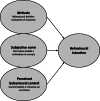Are return to work beliefs, psychological well-being and perceived health related to return-to-work intentions among women on long-term sick leave for common mental disorders? A cross-sectional study based on the theory of planned behaviour
- PMID: 33740921
- PMCID: PMC7977300
- DOI: 10.1186/s12889-021-10562-w
Are return to work beliefs, psychological well-being and perceived health related to return-to-work intentions among women on long-term sick leave for common mental disorders? A cross-sectional study based on the theory of planned behaviour
Abstract
Background: Long-term sick leave due to common mental disorders (CMDs) is a great burden in society today, especially among women. A strong intention to return to work (RTW) as well as symptom relief may facilitate RTW in this group. However, there is a lack of knowledge regarding what constitutes a strong intention. The Theory of Planned Behaviour is well-suited to identifying underlying beliefs about intentions to perform a behaviour. By including psychological well-being and perceived health, a more comprehensive picture of determinants of RTW intention might be achieved. Thus, the aim of the present study was to identify associations between RTW beliefs, psychological well-being, perceived health and RTW intentions among women on long-term sick leave due to CMDs, and to do so based on the Theory of Planned Behaviour.
Methods: The study was cross-sectional. Between October 2019 and January 2020, 282 women on long-term sick leave (> 2 months) due to CMDs were included in the study. The questionnaires for data collection were: "RTW Beliefs Questionnaire", the "General Health Questionnaire -12" and the "EuroQol Visual Analogue Scale". Standard multiple regression analysis was performed both with and without adjustment for potential confounders.
Results: The results showed that a more positive attitude towards RTW, stronger social pressure to RTW, higher perceived control over RTW and higher psychological well-being were associated with stronger RTW intention. The adjusted analysis eliminated the importance of psychological well-being for RTW intention, but showed that women who reported that their employer had taken actions to facilitate their RTW had stronger RTW intention.
Conclusion: The RTW beliefs, derived from the Theory of Planned Behaviour, were all important for a strong RTW intention, while psychological well-being and perceived health showed weaker associations. Furthermore, having an employer that take actions for facilitating RTW was associated with stronger RTW intentions. Though some caution is warranted regarding the representativeness of the sample, the results do improve our understanding of some important determinants of RTW intention among women on long-term sick leave for CMDs.
Keywords: Beliefs; Common mental disorders; Long-term sick leave; Return to work; Women.
Conflict of interest statement
The authors declare that they have no competing interests.
Figures
Similar articles
-
Development and psychometric evaluation of a theory-based questionnaire measuring women's return-to-work beliefs after long-term sick leave for common mental disorders.Work. 2023;76(1):109-124. doi: 10.3233/WOR-220301. Work. 2023. PMID: 36806536 Free PMC article.
-
Predictors of return to work and psychological well-being among women during/after long-term sick leave due to common mental disorders - a prospective cohort study based on the theory of planned behaviour.Health Soc Care Community. 2022 Nov;30(6):e5245-e5258. doi: 10.1111/hsc.13943. Epub 2022 Jul 27. Health Soc Care Community. 2022. PMID: 35894151 Free PMC article.
-
Beliefs About Return to Work Among Women During/After Long-Term Sick Leave for Common Mental Disorders: A Qualitative Study Based on the Theory of Planned Behaviour.J Occup Rehabil. 2021 Sep;31(3):604-612. doi: 10.1007/s10926-020-09946-3. Epub 2021 Jan 25. J Occup Rehabil. 2021. PMID: 33492634 Free PMC article.
-
An overlooked concept? Intention to return to work among individuals on sick leave due to common mental disorders: A scoping review.Health Soc Care Community. 2021 May;29(3):602-611. doi: 10.1111/hsc.13293. Epub 2021 Jan 28. Health Soc Care Community. 2021. PMID: 33506561
-
Stakeholders' Role and Actions in the Return-to-Work Process of Workers on Sick-Leave Due to Common Mental Disorders: A Scoping Review.J Occup Rehabil. 2020 Sep;30(3):381-419. doi: 10.1007/s10926-019-09861-2. J Occup Rehabil. 2020. PMID: 31673934
Cited by
-
Systematic review and tools appraisal of prognostic factors of return to work in workers on sick leave due to musculoskeletal and common mental disorders.PLoS One. 2024 Jul 17;19(7):e0307284. doi: 10.1371/journal.pone.0307284. eCollection 2024. PLoS One. 2024. PMID: 39018306 Free PMC article.
-
Psychosocial well-being index and sick leave in the workplace: a structural equation modeling of Wittyfit data.Front Psychol. 2025 Jan 24;16:1385708. doi: 10.3389/fpsyg.2025.1385708. eCollection 2025. Front Psychol. 2025. PMID: 39927216 Free PMC article.
-
Development and psychometric evaluation of a theory-based questionnaire measuring women's return-to-work beliefs after long-term sick leave for common mental disorders.Work. 2023;76(1):109-124. doi: 10.3233/WOR-220301. Work. 2023. PMID: 36806536 Free PMC article.
-
Predictors of return to work and psychological well-being among women during/after long-term sick leave due to common mental disorders - a prospective cohort study based on the theory of planned behaviour.Health Soc Care Community. 2022 Nov;30(6):e5245-e5258. doi: 10.1111/hsc.13943. Epub 2022 Jul 27. Health Soc Care Community. 2022. PMID: 35894151 Free PMC article.
References
-
- World Health Organization. Depression and other Common Mental Disorders: Global Health Estimates. Available from: https://apps.who.int/iris/bitstream/handle/10665/254610/WHO-MSD-MER-2017....
-
- Försäkringskassan (Social Insurance Agency). Socialförsäkringsrapport. Sjukfrånvaro i psykiatriska diagnoser. En registerstudie av Sveriges arbetande befolkning i åldern 20–69 år/Social Insurance Report. Sickness absence for psychiatric disorders. A register study of Sweden’s working population aged [Internet]. 2020 [cited 2020 Dec 16]. Available from: https://www.forsakringskassan.se/wps/wcm/connect/e12b777c-e98a-488d-998f... MOD=AJPERES&CVID.
-
- Vingård E. Psykisk ohälsa, arbetsliv och sjukfrånvaro. En kunskapsöversikt/Mental illness, working life and sickness absence. An overview of current knowledge. A report from FORTE (Swedish Research Council for Health, Working life and Welfare) [Internet]. 2020 [cited 2020 Dec 17]. Available from: https://forte.se/publikation/psykisk-ohalsa-arbetsliv-och-sjukfranvaro/
-
- EU. Sick pay and sickness benefit schemes in the European UnionBackground reportfor the Social Protection Committee’sIn-Depth Review on sickness benefits Brussels, 17 October 2016 [Internet]. 2016. Available from: https://op.europa.eu/en/publication-detail/-/publication/fc7a58b4-2599-1....
Publication types
MeSH terms
LinkOut - more resources
Full Text Sources
Other Literature Sources
Medical


